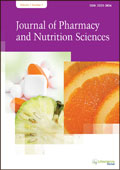jpans
Abstract : Cordyceps militaris (L.) Link:Chemical Bioactive Compounds and Pharmacological Activities
|
|
Abstract: Cordyceps militaris (L.) Link is an important medicinal mushroom used in traditional medicine for treatment of many diseases and improving human health. C. militaris are now widely used in many modern pharmaceutical dosages. It contains many bioactive compounds such as cordycepin, adenosine, sterols, polysaccharides, etc. These compounds provided many beneficial biological activities such as anticancer, antiproliferative, pro-sexual, antioxidant, antibacterial, antifungal, antiviral, immunomodulatory, antiinflammatory and others for C. militaris. The present review highlights the chemical bioactive compounds and pharmacological activities of this medicinal mushroom C. militaris. Keywords: Cordyceps militaris,cordycepin, bioactive compound, pharmacological activity, traditional medicine. |
Abstract : Pulse Phytonutrients: Nutritional and Medicinal Importance
|
|
Abstract: Pulses are important food crops which offer significant nutritional and health advantages due to their high protein content and a unique nutritional profile, i.e., low fat source of digestible protein, dietary fibre, complex carbohydrates, resistant starch and a number of essential vitamins, especially, the B-group vitamin B9 (folate). In addition to these vitamins and minerals contributing to a healthy diet, pulses contain a number of non-nutritive bioactive substances including enzyme inhibitors, lectins, saponins, phytates, phenolic compounds and oligosaccharides. The latter contributes beyond basic nutritional value and is particularly helpful in the fight against non-communicable diseases often associated with diet transitions and rising incomes. Phytic acid exhibits antioxidant activity and protects DNA damage, phenolic compounds have antioxidant and other important physiological and biological properties, and galacto-oligosaccharides may elicit prebiotic activity. Research findings on different phytochemicals in pulse seeds and their role in preventing the lifestyle diseases has been discussed. Encouraging awareness of the nutritional value of pulses can help consumers adopt healthier diets and also could be an important dietary factor in improving longevity. Keywords: Pulses, polyphenols, carotenoids, saponins, tocopherols, folates. |
Abstract : EDITORIAL Probiotics, Gut Microbiota and Immunomodulation: Is this the Key to Counteract the Allergy Epidemics?
|
|
Editorial Download Full Article |
Abstract : The Use of Probiotics in Respiratory Allergy
|
|
Abstract: There is a high and steadily increasing prevalence of respiratory allergy throughout the world, especially in paediatric population and in industrialized and developing countries. A complex interplay between genetic and environmental factors has been implicated to explain this dramatic increase in prevalence of allergic diseases. It has been suggested that exposure to microbes plays a critical role in the development of the early immune system and may contribute to allergic diseases through their effect on mucosal immunity. Probiotics, microorganisms exerting beneficial effects on the host, are used in a great number of paediatric and adult diseases, mainly gastrointestinal disorders, but they have been proposed to be beneficial also in allergic diseases. Different trials have been published finding benefits in the use of probiotics in prevention and treatment of atopic dermatitis, but to date, studies have yielded inconsistent findings to support a protective association between their use on prevention of allergic rhinitis or asthma. However, probiotics may be beneficial in improving symptoms and quality of life in patients with allergic rhinitis although it remains limited due to study heterogeneity and variable outcome measures. As a result of these controversies, future investigations with a better standardization are needed. In this review, we summarize recent clinical research to elucidate the mechanisms of probiotics and their effect in respiratory allergy. According to published data, probiotics could emerge as a novel, complementary treatment option for allergic rhinitis but not for asthma. Keywords: |






















